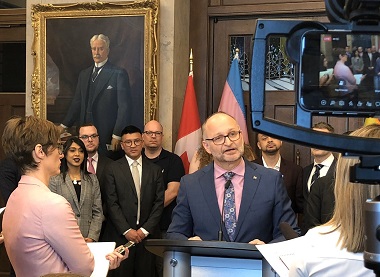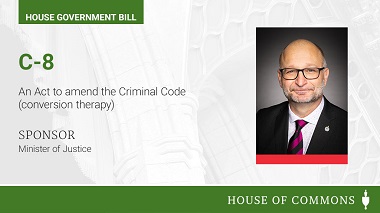
Justice Minister David Lametti announcing Bill C-8. Photo from his Twitter feed, with these words: “I am proud of this important step taken by our government to protect the LGBTQ2 community, especially youth.”
Justice Minister David Lametti introduced Bill C-8 March 9, to add conversion therapy offences to the Criminal Code.
The bill defines conversion therapy broadly and includes attempts to modify or reduce sexual behaviour.
It creates offences such as receiving a financial or material benefit from conversion therapy, causing a child to undergo conversion therapy or causing a person to undergo conversion therapy against their will.
Following is a document jointly produced by the Evangelical Fellowship of Canada (EFC), Canadian Council of Christian Charities (CCCC) and the Christian Legal Fellowship (CLF) which offers guidance for churches on issues related to conversion therapy.
Conversion therapy bans have been passed or proposed at all levels of government: municipal, provincial and federal. Many people who have experienced conversion therapy describe despair and suicidal ideation as a consequence.
Initiatives to ban conversion therapy arise from a desire to protect Canadians from such damaging effects. We share these concerns. Coercive/involuntary efforts to “change” sexual orientation have no place within our communities.
Still, many in the Christian community are deeply concerned about efforts to put conversion therapy bans in place. Why?
The definition of conversion therapy in many of these bans is very broad. It expands beyond
discredited practices – which are rightly condemned – to include “any practice . . . that seeks to change sexual orientation or gender identity, or eliminate or reduce sexual attraction or behaviour between persons of the same sex.”
What are the concerns?
Broadly worded conversion therapy bans could impact freedom of expression and the ability of Canadians to live according to their religious conscience or personal convictions, in the following ways:
- Effectively prevent people from freely accessing the help and support they voluntarily seek to live out their personal identity, including the teaching and practice of traditional Christian beliefs regarding gender and sexuality. Canadians must be free to order their sexual lives in accordance with their religious conscience, faith identity and personal convictions, and voluntarily access support from their faith community, pastoral care and other supports in doing so.
- Limit or prohibit those within churches and faith-based communities, and even within families, from praying, encouraging discipleship and engaging in religious instruction concerning human sexuality, and offering pastoral care to those who voluntarily seek support on this matter.
- Restrict the diagnosis and treatment offered by a medical professional to a patient with gender dysphoria, so that the only acceptable treatment option is affirmation and support to transition. This would prevent medical professionals from being able to use their professional judgment to best treat the patient before them.
When the government undertakes initiatives to prohibit any harmful activity, it should always be narrowly focused on the specific activity. It should not overreach. In this case, the focus is and should remain on abusive and coercive practices.
How we can engage wisely
Canada’s current conversations around conversion therapy create unique opportunities for Christians to thoughtfully reflect on how we can improve our own witness, and meaningfully engage with political leaders. Our goal is to seek the well-being of our land (Jeremiah 29:7) and to live out the gospel call to love our neighbour (Matthew 22:39).
 As we engage on this difficult issue, it is important that we do so with gentleness and respect (1 Peter 3:15).
As we engage on this difficult issue, it is important that we do so with gentleness and respect (1 Peter 3:15).
This is an opportunity for constructive dialogue. It is an opportunity to demonstrate love and grace to LGBTQ+ people in our communities, and for the love of Christ to be known. We must, then, be prayerful and wise in our communications to elected officials.
We propose the following key messages may be useful as you thoughtfully and prayerfully engage at the municipal, provincial or federal levels of government:
We affirm:
- That all people are created in God’s image and are loved by God, having equal dignity and worth
- That coercive or abusive practices to “change” sexual orientation have no place within our communities
- That as followers of Jesus Christ, we are called to first love God and then to love all our neighbours as ourselves
- God’s design for sexuality, as taught in the Bible; recognizing to our sorrow that the church has not always responded with grace when dealing with matters of sexuality
We urge elected officials to:
- Consult with faith communities to find ways to work together to prevent abuse
- Consult with faith communities to find ways to protect religious identity and expression
- Affirm the rights of all Canadians to conduct their personal lives in accordance with their religious conscience, faith identity and personal convictions
- Recognize that the family is the natural environment for the growth and well-being of children, and parents as the protectors and advocates for the best interests of their children
We ask that any definition of conversion therapy:
- Allow for good faith teaching and discussions on conscientious beliefs or opinions, whether they are moral, religious, scientific or otherwise
- Maintain the right of individuals to access support to live in a way that is consistent with their religious conscience and personal convictions
- Protect the ability of psychotherapists and other medical professionals to use their professional judgment in caring for their patients
- Respect the fundamental right to family integrity, including the autonomy of families to live according to their own religious and moral beliefs and to freely share them between generations without undue state interference
- Preserve Canadians’ ability to seek, and religious communities’ ability to offer, pastoral care, religious teaching, prayer and support from clergy and others within the religious community
Action steps:
- Pray for wisdom and grace. Pray for the love of Christ to be known in our communities
- Call or write to your local City Councillor, [provincial] MLA or federal MP to express your concerns about possible overreach in efforts to ban conversion therapy
This ‘Church Guidance: Conversion Therapy’ document is re-posted by permission.

Well thought through and presented. Thank you.